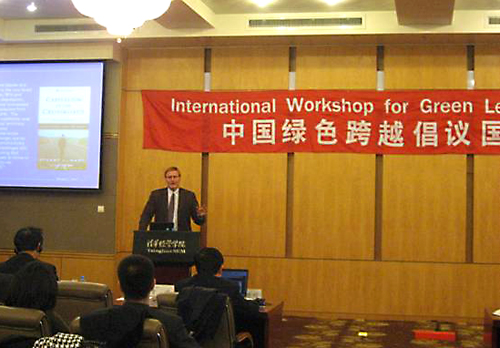The “International Workshop for Green Leap (China)” took place on December 8that Tsinghua SEM. The event was jointly hosted by Tsinghua University Research Center for Technological Innovation, William Davidson Institute at the University of Michigan and Johnson School of Management of Cornell University. More than 40 spokesmen from relevant government departments, university and research institutes and NGO organization attended the conference.
Before the conference, Chen Jining, Vice President of Tsinghua University, met with the guest speakers at the meeting – Professor Stuart L. Hart, the distinguished fellows in William Davidson Institute of the University of Michigan, and Dr. Mark Milstein, director of the Center for Sustainable Global Enterprise in Cornell University. Xia Guangzhi, Deputy director of International Cooperation and exchanges office, and Tong Yunhuan, Associate Dean of Tsinghua SEM, attended the meeting.
In the conference, Professor Stuart L. Hart firstly introduced the definition of “Green Leap”.He said, "Green" implied sustainable clean technology, and "leap" emphasized that the nature of clean was innovation and breakthrough in technologies. We could persuade the low-income people to join the clean technology and international marketing campaign. He mentioned that, in order to realize the economic sustainable development in China, more agricultural population should be involved in this “leap” process, and at the same time, the corporation would develop a suitable business model to promote this “leap”. The “Green leap” program proposed by Professor Hart has been investigated and developed in business model in Indian and other developing countries. This time of “International Workshop for Green Leap (China)” means the initiation of the project in China.

(Professor Stuart L. Hart Delivers Speech)
Tong Yunhuan, the Associate Dean, gave a speech on “Promoting sustainable innovation in China”. He said, when talking about sustainable development, people were always thinking about green development, for example how to protect ecological system, how to conserve the natural resources.This understanding seems too one-sided, for the sustainable development itself still contained the social justice and human society sustainability.He said, another point of sustainable development was its social environment, and which is the social sustainable development demanded by the market. The corporation needs sustainable development, which means the sustainability of environment and the innovation capacity inside the enterprise.He thought that, there were still many things useful to research for the academic institute and corporation. The “Green Leap” project was to promote the research and business in this field.
Jia Feng, the vice director of China Environmental Education Center, Jiang PengMing, the board chairman in LvChuang., Lv JianBo, the assistant of board chairman in Group Changhong of Shandong, Liu Huadong,the director of "Chinese Entrepreneurs", and Yang Huanjie, the editor-in-chief of “Managermant”, had gave a speech on their own relevant topic. Gao Xudong, director of MBA programs and vice director in National Center for Economic Research of SEM, hosted this meeting.
Appendix: Brief introduction of Professor Stuart L. Hart
Professor Stuart L. Hart is one of the world's top authorities on the implications of sustainable development and environmentalism for business strategy. He was the distinguished fellows in William Davidson Institute of the University of Michigan, Johnson Chair in Sustainable Global Enterprise and the advanced consulter in several global famous company, such as DuPont, HP, P&G and Shell. He wrote the seminal article "Beyond Greening: Strategies for a Sustainable World," which won the McKinsey Award for Best Article in Harvard Business Review in 1997, and helped launch the movement for corporate sustainability.
 Latest News
Latest News